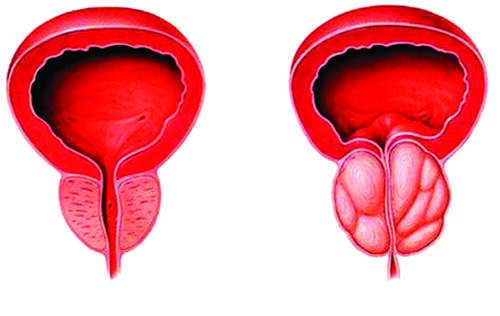Dr Rajeev Gupta
The prostate gland is a male reproductive organ that is about the size of a walnut, found at the base of the Urinary bladder. Prostate enlargement, also known as Benign prostatic hypertrophy (BPH) is the most common prostate problem in men. Almost all men will develop some enlargement of the prostate as they age. Overall, the number of men with BPH increases progressively with age. By age 60, 50% of men will have some signs of BPH. By age 85, 90% of men will have signs of the condition. BPH and prostate cancer have similar symptoms, and a man who has BPH may have undetected cancer at the same time.
DO’s and Don’ts to avoid Prostate Cancer
Do’s
Don’t
· Regular Exercise
· Eat Healthy: Include Cereals, Fish, and Green leafy Vegetable
· Don’t Ignore Frequent need to urinate, especially at night
· Don’t Ignore a weak or interrupted urinary stream
· Don’t Overlook Blood in urine or semen
· Avoid red meat
Prostate cancer incidences are increasing in India. Incidence of prostate cancer is increasing by 2.5% every year among Indian race while rest of the races it is 3 %. Lung cancer is most prevalent cancer in Indian men and prostate cancer is becoming second most prevalent cancer causing deaths among men in India. With the increased migration of rural population to the urban areas, changing life styles, increased awareness, and easy access to medical facility, more cases of prostate cancer are being detected.
70 % of all prostate cancers are diagnosed in men over the age of 65. It is still unclear why prostate cancer occurs more in elderly population but studies suggest that after 70, most men have some form of prostate cancer, though there may be no outward symptoms.
Signs & Symptoms of Prostate Cancer
· Frequent, difficult or painful urination
· Not being able to urinate
· Weak or interrupted urine flow
· Blood in the urine
· Blood in the semen
· Painful ejaculation
· Frequent pain or stiffness in the lower back, hip or upper thighs
Risk factors of Prostate Cancer are numerous , out of which , Age, which is the most influential risk factor. If you are a man above the age of 65 and have lately been suffering from a frequent need to urinate, especially at night, a weak or interrupted urinary stream and blood in urine or semen, it’s time you take these symptoms seriously. Regarded as the most classic signs of prostate cancer, these symptoms are often overlooked and blamed on old age. Your risk is higher with family history of prostate cancer. High fat diet particularly animal fat may increase your risk. Diets high in fruits and vegetables are thought to decrease your risk.
Since cancer screening is not routinely available in India, our main aim should be, to start screening our patients to detect early Prostate Cancer , it translate in reduction of death rate by 5.3% and to exploit the advantage of early stage cancer treatment .
Prostate cancer screening involve a simple blood test, known as Serum PSA test , once in a year , in men above the age of 50 and in men at an even higher risk, such as having several relatives with a history of prostate cancer at an early age, could begin testing at age 40. Digital rectal examination is done by the doctor to detect any abnormality in the prostate gland .
If the patient is found to have the signs and symptoms , as mentioned he should go for further diagnosis. Diagnosis of prostate cancer is done by biopsy from the prostate gland. Biopsy will confirm the diagnosis and also shows whether the cancer is low grade or high grade cancer. Depending on the level of PSA, further test like CT scan or bone scan may be needed for staging purpose & treatment planning.
Treatment of Prostate cancer depends on age, general well being and life expectancy of the patient and Stage of disease. treatment for the disease depends on the extent of the cancer and how far it has spread. In cases of early stage disease (stage 1 & 2) , you may need to undergo a surgery (prostatectomy) &/or Radiotherapy, that result in long term cure , but in cases of advanced stage ( stage 3 & 4) , cure may not be possible , treatment is aimed at halting or slowing down the disease process , that results in prolongation of life , using hormonal therapy with androgen-depriving drugs & chemotherapy.
Only Way to Increase survival in Prostate is to watch for signs and symptoms of Prostate cancer , After the age of 65 go for regular PSA test screening and ultimately follow the Do’s and Don’t as mentioned in Table 1 ,to be healthy.
(Author is working as Assistant Professor at Sri Guru RamDass Institute of Medical Sciences & Research, Amritsar & consultant Medical Oncologist & Hematologist at Sanjeevani Cancer Clinic, Jammu .
If any query, Dr Rajeev Gupta can contacted @ email: drrajeevgupta1@gmail.com)
Trending Now
E-Paper


